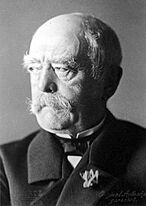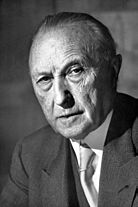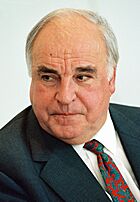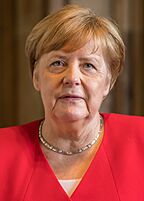List of chancellors of Germany facts for kids
- Top left: Otto von Bismarck was Germany's first chancellor. He led the creation of the North German Confederation and later the German Empire.
- Top right: Konrad Adenauer was the first chancellor of West Germany (the Federal Republic of Germany).
- Bottom left: Helmut Kohl was chancellor when Germany reunited in 1990.
- Bottom right: Angela Merkel was the first woman to become chancellor of Germany.
The chancellor of Germany is the main political leader of Germany. They are the head of the country's government. The chancellor chooses other government members and leads important meetings.
This important job started in 1867 in the North German Confederation. Otto von Bismarck was the very first chancellor. When Germany united in 1871 and became the German Empire, the leader was still called the chancellor. At first, the chancellor only answered to the emperor. But in 1918, things changed. The German Parliament gained the power to remove the chancellor. Under the 1919 Weimar Constitution, presidents appointed chancellors. However, these chancellors were still responsible to the Parliament.
The rules changed again during the Nazi regime from 1933 to 1945. After World War II, during the Allied occupation, Germany had no independent government or chancellor. East Germany did not bring back the role of chancellor. Instead, its government was led by the chairman of the Council of Ministers. In 1949, the Basic Law made the chancellor the most powerful person in West Germany. It also reduced the role of the president.
Contents
Germany's First Chancellors (1867–1918)
The North German Confederation was formed after the Austro-Prussian War in 1866. The king of Prussia, William I, chose the chancellor.
Political parties: None
| Picture | Name (Born–Died) |
Time in Office | Political Party | ||||
|---|---|---|---|---|---|---|---|
| Started | Ended | How long | |||||
| 1 |  |
Otto von Bismarck (1815–1898) |
1 July 1867 |
21 March 1871 |
3 years, 263 days | Not part of a party | |
Chancellors of the German Empire (1871–1918)
The German Empire grew out of the North German Confederation. This happened after the Franco-Prussian War (1870-1871). The Prussian king, who was now also the Emperor, chose the chancellor.
Political parties: None Centre
| Picture | Name (Born–Died) |
Time in Office | Political Party | Government | |||||
|---|---|---|---|---|---|---|---|---|---|
| Started | Ended | How long | |||||||
| 1 |  |
Otto von Bismarck (1815–1898) |
21 March 1871 |
20 March 1890 |
18 years, 364 days | Not part of a party | Bismarck | ||
| 2 |  |
Leo von Caprivi (1831–1899) |
20 March 1890 |
26 October 1894 |
4 years, 220 days | Not part of a party | Caprivi | ||
| No chancellor between 26 October 1894 and 29 October 1894 | |||||||||
| 3 |  |
Chlodwig zu Hohenlohe-Schillingsfürst (1819–1901) |
29 October 1894 |
17 October 1900 |
5 years, 353 days | Not part of a party | Hohenlohe-Schillingsfürst | ||
| 4 |  |
Bernhard von Bülow (1849–1929) |
17 October 1900 |
14 July 1909 |
8 years, 270 days | Not part of a party | Bülow | ||
| 5 |  |
Theobald von Bethmann Hollweg (1856–1921) |
14 July 1909 |
13 July 1917 |
7 years, 364 days | Not part of a party | Bethmann Hollweg | ||
| 6 |  |
Georg Michaelis (1857–1936) |
14 July 1917 |
1 November 1917 |
110 days | Not part of a party | Michaelis | ||
| 7 |  |
Georg von Hertling (1843–1919) |
1 November 1917 |
30 September 1918 |
333 days | Centre Party | Hertling | ||
| No chancellor between 30 September 1918 and 3 October 1918 | |||||||||
| 8 |  |
Max von Baden (1867–1929) |
3 October 1918 |
9 November 1918 |
37 days | Not part of a party | Baden | ||
Chancellors of the Weimar Republic (1918–1933)
On November 9, 1918, Chancellor Max von Baden gave his job to Friedrich Ebert. Ebert led the government during the time between the end of the German Empire and the first meeting of the National Assembly. He was Chairman of the Council of the People's Deputies.
The Weimar Constitution of 1919 created the Weimar Republic. The president officially appointed the chancellors. Sometimes, a chancellor did not have a majority of support in the Parliament.
Political parties: SPD Centre DVP NSDAP None
| Picture | Name (Born–Died) |
Time in Office | Political Party | Government | Parliament | ||||
|---|---|---|---|---|---|---|---|---|---|
| Started | Ended | How long | |||||||
| 9 |  |
Friedrich Ebert (1871–1925) |
9 November 1918 |
13 February 1919 |
96 days | Social Democratic Party | Council of the People's Deputies | – | |
| 10 |  |
Philipp Scheidemann (1865–1939) |
13 February 1919 |
20 June 1919 |
127 days | Social Democratic Party | Scheidemann | Nat.Ass. | |
| 11 |  |
Gustav Bauer (1870–1944) |
21 June 1919 |
14 August 1919 |
54 days | Social Democratic Party | Bauer | ||
| 12 |  |
Gustav Bauer (1870–1944) |
14 August 1919 |
26 March 1920 |
219 days | Social Democratic Party | Bauer | Nat.Ass. | |
| 13 |  |
Hermann Müller (1876–1931) |
27 March 1920 |
21 June 1920 |
86 days | Social Democratic Party | Müller I | ||
| No chancellor between 21 June 1920 and 25 June 1920 | |||||||||
| 14 |  |
Constantin Fehrenbach (1852–1926) |
25 June 1920 |
10 May 1921 |
319 days | Centre Party | Fehrenbach | 1 (Jun.1920) |
|
| 15 |  |
Joseph Wirth (1879–1956) |
10 May 1921 |
22 November 1922 |
1 year, 196 days | Centre Party | Wirth I | ||
| Wirth II | |||||||||
| 16 |  |
Wilhelm Cuno (1876–1933) |
22 November 1922 |
12 August 1923 |
263 days | Not part of a party | Cuno | ||
| 17 |  |
Gustav Stresemann (1878–1929) |
13 August 1923 |
30 November 1923 |
109 days | German People's Party | Stresemann I | ||
| Stresemann II | |||||||||
| 18 |  |
Wilhelm Marx (1863–1946) |
30 November 1923 |
15 January 1925 |
1 year, 46 days | Centre Party | Marx I | ||
| Marx II | 2 (May 1924) |
||||||||
| 19 |  |
Hans Luther (1879–1962) |
15 January 1925 |
12 May 1926 |
1 year, 117 days | Not part of a party | Luther I | 3 (Dec.1924) |
|
| Luther II | |||||||||
| – |  |
Otto Gessler (1875–1955) Acting |
12 May 1926 |
17 May 1926 |
5 days | German Democratic Party | |||
| 20 |  |
Wilhelm Marx (1863–1946) |
17 May 1926 |
28 June 1928 |
2 years, 42 days | Centre Party | Marx III | ||
| Marx IV | |||||||||
| 21 |  |
Hermann Müller (1876–1931) |
28 June 1928 |
27 March 1930 |
1 year, 272 days | Social Democratic Party | Müller II | 4 (May 1928) |
|
| No chancellor between 27 March 1930 and 30 March 1930 | |||||||||
| 22 |  |
Heinrich Brüning (1885–1970) |
30 March 1930 |
1 June 1932 |
2 years, 63 days | Centre Party | Brüning I | 5 (Sep.1930) |
|
| Brüning II | |||||||||
| 23 |  |
Franz von Papen (1879–1969) |
1 June 1932 |
3 December 1932 |
185 days | Not part of a party | Papen | 6 (Jul.1932) |
|
| 24 |  |
Kurt von Schleicher (1882–1934) |
3 December 1932 |
30 January 1933 |
58 days | Not part of a party | Schleicher | 7 (Nov.1932) |
|
| 25 |  |
Adolf Hitler (1889–1945) |
30 January 1933 |
23 March 1933 |
52 days | National Socialist German Workers' Party |
Hitler | 8 (Mar.1933) | |
Chancellors During Nazi Germany (1933–1945)
Soon after Adolf Hitler became chancellor in 1933, the German Parliament passed a law. This law, called the "Enabling Act," gave the chancellor huge powers. It marked the end of the Weimar Republic and the start of Nazi Germany. Hitler then took away all democratic systems. He gathered all power for himself. After President Paul von Hindenburg died in 1934, Hitler combined the jobs of chancellor and president. He called himself "Führer und Reichskanzler."
Political parties: NSDAP
| No. | Picture | Name (Born–Died) |
Time in Office | Political Party | Government | Parliament | |||
|---|---|---|---|---|---|---|---|---|---|
| Started | Ended | How long | |||||||
| 26 |  |
Adolf Hitler (1889–1945) |
23 March 1933 |
30 April 1945 |
12 years, 38 days | National Socialist German Workers' Party |
Hitler | 9 (Nov.1933) | |
| 10 (Mar.1936) | |||||||||
| 11 (Apr.1938) | |||||||||
| 27 |  |
Joseph Goebbels (1897–1945) |
30 April 1945 |
1 May 1945 |
1 day | National Socialist German Workers' Party |
Goebbels | — | |
| 28 |  |
Lutz Graf Schwerin von Krosigk (1887–1977) |
2 May 1945 |
23 May 1945 |
21 days | National Socialist German Workers' Party |
Schwerin von Krosigk | — | |
Chancellors of Modern Germany (1949–Present)
In 1949, Germany split into two separate countries. These were the Federal Republic of Germany (West Germany) and the German Democratic Republic (East Germany). The list below shows the chancellors of West Germany. East Germany's government was led by the chairman of the Council of Ministers. In 1990, East Germany joined West Germany. Germany was reunited. It kept the name Federal Republic of Germany.
Political parties: CDU (6) SPD (4) Denotes acting (i.e. temporary)
| Picture | Name (Born–Died) |
Time in Office | Political Party | Government | Bundestag | ||||
|---|---|---|---|---|---|---|---|---|---|
| Started | Ended | How long | |||||||
| 1 |  |
Konrad Adenauer (1876–1967) |
15 September 1949 |
15 October 1963 |
14 years, 30 days | Christian Democratic Union (CDU) |
Adenauer I | 1 (1949) | |
| Adenauer II | 2 (1953) | ||||||||
| Adenauer III | 3 (1957) | ||||||||
| Adenauer IV | 4 (1961) | ||||||||
| 2 |  |
Ludwig Erhard (1897–1977) |
15 October 1963 |
30 November 1966 |
3 years, 45 days | Independent | Erhard I | ||
| Erhard II | 5 (1965) | ||||||||
| 3 |  |
Kurt Georg Kiesinger (1904–1988) |
30 November 1966 |
21 October 1969 |
2 years, 324 days | Christian Democratic Union (CDU) |
Kiesinger | ||
| 4 |  |
Willy Brandt (1913–1992) |
21 October 1969 |
7 May 1974 |
4 years, 197 days | Social Democratic Party (SPD) |
Brandt I | 6 (1969) | |
| Brandt II | 7 (1972) | ||||||||
| – |  |
Walter Scheel (1919–2016) Acting |
7 May 1974 |
16 May 1974 |
9 days | Free Democratic Party (FDP) |
Brandt II (acting) |
||
| 5 |  |
Helmut Schmidt (1918–2015) |
16 May 1974 |
1 October 1982 |
8 years, 138 days | Social Democratic Party (SPD) |
Schmidt I | ||
| Schmidt II | 8 (1976) | ||||||||
| Schmidt III | 9 (1980) | ||||||||
| 6 |  |
Helmut Kohl (1930–2017) |
1 October 1982 |
27 October 1998 |
16 years, 26 days | Christian Democratic Union (CDU) |
Kohl I | ||
| Kohl II | 10 (1983) | ||||||||
| Kohl III | 11 (1987) | ||||||||
| Kohl IV | 12 (1990) | ||||||||
| Kohl V | 13 (1994) | ||||||||
| 7 |  |
Gerhard Schröder (born 1944) |
27 October 1998 |
22 November 2005 |
7 years, 26 days | Social Democratic Party (SPD) |
Schröder I | 14 (1998) | |
| Schröder II | 15 (2002) | ||||||||
| 8 |  |
Angela Merkel (born 1954) |
22 November 2005 |
8 December 2021 |
16 years, 16 days | Christian Democratic Union (CDU) |
Merkel I | 16 (2005) | |
| Merkel II | 17 (2009) | ||||||||
| Merkel III | 18 (2013) | ||||||||
| Merkel IV | 19 (2017) | ||||||||
| 9 |  |
Olaf Scholz (born 1958) |
8 December 2021 |
6 May 2025 |
3 years, 149 days | Social Democratic Party (SPD) |
Scholz | 20 (2021) | |
| 10 |  |
Friedrich Merz (born 1955) |
6 May 2025 |
Incumbent | 299 days | Christian Democratic Union (CDU) |
Merz | 21 (2025) | |
Timeline of German Chancellors
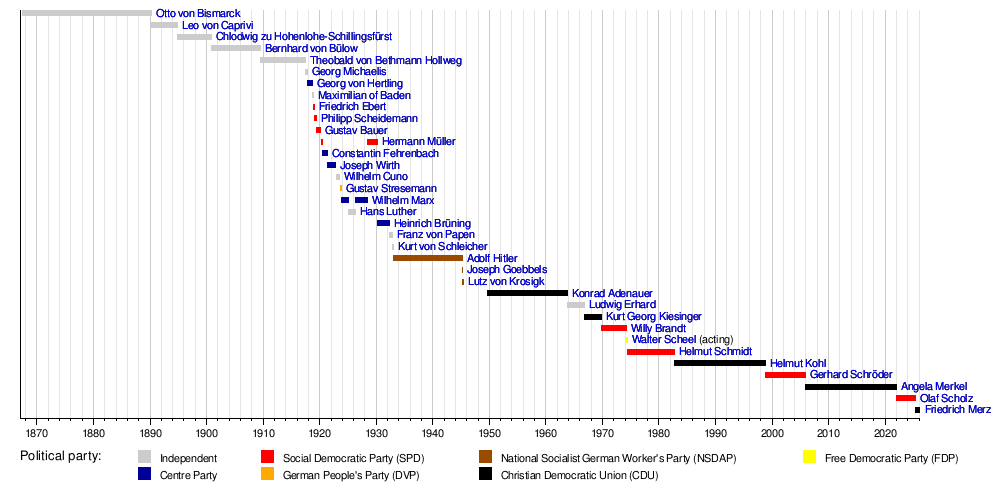
More About German Leaders
- Leaders of East Germany
- How long chancellors served
- Kings and Queens of Germany
- Presidents of Germany
- Germany's Vice-Chancellors
 | Emma Amos |
 | Edward Mitchell Bannister |
 | Larry D. Alexander |
 | Ernie Barnes |


